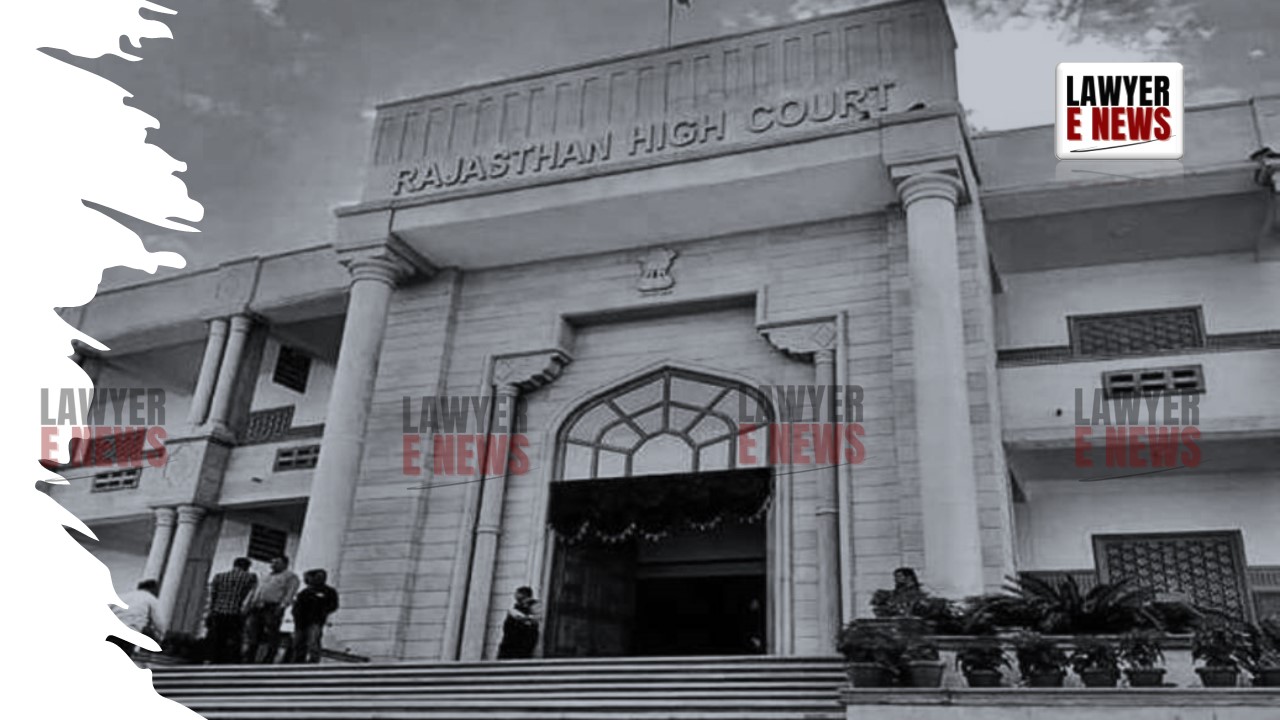-
by Admin
15 February 2026 5:01 PM



Prohibition Under Section 42(b) of Rajasthan Tenancy Act is Absolute – Rajasthan High Court dismissed a writ petition challenging orders that had denied khatedari rights over land belonging to a Scheduled Caste (SC) person.
Justice Avneesh Jhingan, while upholding the revenue authorities' concurrent findings, held: "A person purchasing land in contravention of Section 42 of the Rajasthan Tenancy Act cannot acquire khatedari rights through adverse possession. The prohibition under the Act is absolute, and any such transaction is void ab initio, conferring no legal right, title, or interest upon the purchaser."
The dispute arose from a registered sale deed dated July 6, 1965, through which the petitioners, Anandi Lal and Radhey Shyam, had purchased 47 bighas 13 biswas of land from Mohana, a Scheduled Caste landowner.
The sale violated Section 42(b) of the Rajasthan Tenancy Act, 1955, which prohibits the transfer of land belonging to an SC/ST person to a non-SC/ST individual.
The petitioners faced a series of legal challenges over the years:
Their ejectment was initially ordered by the Sub-Divisional Officer (SDO) under Section 183B for being trespassers on SC land. However, the Revenue Appellate Authority (RAA) reversed this decision in 1986, recognizing their adverse possession for over twelve years. The petitioners then sought declaration of khatedari rights, but their suit was dismissed in 1997, with appeals and a review petition subsequently rejected by the Board of Revenue in 1999 and 2004, respectively.
Aggrieved by these decisions, they filed the present writ petition before the Rajasthan High Court.
Can khatedari rights be claimed over SC land through adverse possession if the original sale was in violation of Section 42(b) of the Rajasthan Tenancy Act, 1955?
On this point, the Court held: "The issue is no longer res integra. A person purchasing land in contravention of Section 42 of the Act cannot acquire khatedari rights by adverse possession. The prohibition under Section 42 is absolute, and such a transfer is void."
Referring to Sita Ram v. Board of Revenue, 2012 SCC OnLine Raj 2502, the Court reaffirmed: "It is settled legal position that when a person has purchased land in contravention of Section 42, he cannot acquire khatedari rights by adverse possession."
"Res Judicata Does Not Apply to Proceedings Under Section 183B"
The petitioners argued that since the RAA had upheld their adverse possession in the ejectment proceedings under Section 183B, this should operate as res judicata, barring the rejection of their khatedari claim.
Rejecting this contention, the Court clarified: "The principle of res judicata does not apply in the present case. The issue in proceedings under Section 183B was the ejectment of the petitioners as trespassers. The suit for khatedari declaration was a distinct and independent legal question."
Referring to Syed Mohd. Salie Labbai v. Mohd. Hanifa, (1976) 4 SCC 780, the Court explained: "For res judicata to apply, the subject matter of both suits must be identical. Since the proceedings under Section 183B and the suit for declaration of khatedari rights had different subject matters, the petitioners cannot rely on res judicata."
"Void Sale Confers No Legal Rights"
The Court reiterated that since the 1965 sale transaction was void ab initio, the petitioners had no lawful title or interest in the land.
"Since the sale transaction itself was void, no legal consequences could arise from it. Adverse possession cannot be claimed over land that was unlawfully acquired."
The Court upheld the revenue authorities' concurrent findings that: "The land continued to be recorded in the name of the seller's son, reinforcing that the petitioners could not claim khatedari rights. Section 42 of the Rajasthan Tenancy Act renders the sale void, and therefore, no rights accrue to the petitioners."
Dismissing the writ petition, the Court concluded: "The suit was rightly dismissed in view of Section 42(b) of the Rajasthan Tenancy Act, and in the light of settled precedent that khatedari rights over SC land cannot be claimed through adverse possession."
Since there was no factual or legal error in the revenue authorities' decisions, the petition was dismissed in its entirety.
Date of Judgment: February 3, 2025
